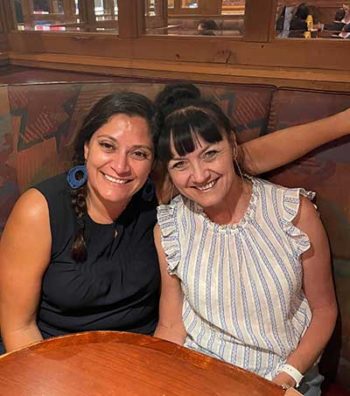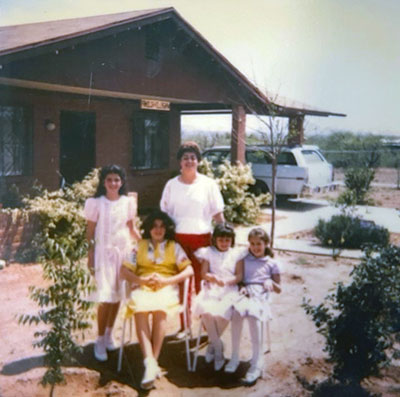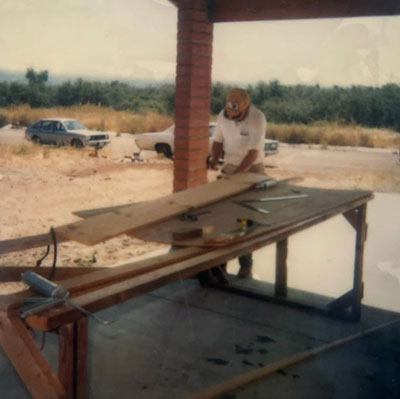By Suzanne Anarde, RCAC CEO

In honor of National Homeownership Month, I interviewed Nadia Villagrán, a dear friend and colleague, about the impact Mutual Self-Help Housing (MSH) had on her childhood and life. She shared tidbits with me during the past 20 years, but this was a true interview—complete with laughs, tears and heartfelt gratitude for her life journey and her parents who made a deep commitment to providing a forever home for their four young daughters.
Nadia was six years old when her parents began their MSH journey in Amado, Arizona, between Nogales and Tucson. There were 10 other families in the building group with Nadia’s parents, Luis and Maria Villagrán.
Her parents were Mexican immigrants who worked hard and were family focused. But the road to Amado was not an easy one for the Villagrán family. They initially moved from Ciudad Juarez to Corpus Christi where hurricane devastation derailed their dreams of a better life. The family regrouped and moved to Tucson, where Luis had relatives, to pursue their American dream. Once in Tucson, Luis and Maria quickly realized that south Tucson was a difficult place to raise a family, with high crime and drug use. They protected their four girls and did the best they could, but they continued to look for a better opportunity. When they heard about the MSH program, they reached out to PPEP, a MSH organization in Tucson in the 80s. Nadia recalls the long process, while her parents painstakingly completed the U.S. Department of Agriculture mortgage paperwork. Nadia said that her parents dressed all four girls in their Easter dresses for a photo that they included in the MSH packet. And, once approved, she and her sisters spent hours hanging out in the lobby while their parents completed the various trainings and attended building group meetings.

Nadia has a twin sister and two older sisters. She jokes that their family exhibited “girl power” early on. She remembers hanging out at the home sites on weekends during the MSH build. Her parents did not have childcare, nor could they have afforded it. The girls were often looked after by elders who were building group participants. This helped to build the MSH group community and provided the girls with built in grandparents.
To the Villagrán girls the construction process seemed to take forever, but they were fascinated watching their parents, a carpenter dad and housewife mom, throughout the process. Particularly poignant for Nadia was seeing her mom in a different light, as she worked side-by-side with the men installing cabinets, roofing and flooring. It was empowering! She realized that if her mom could do those things, she and her sisters could do anything they set their minds to.
I asked Nadia to share some of her memories and articulate how the MSH experience had shaped her future. Her favorite memory was of her mom and dad on a roof with others during a rainy day. They were installing shingles and they had used a blue tarp to create a makeshift tent. She clearly remembers thinking her parents were superheroes! She remembers the awe of seeing her dad install cabinets in every single house and realized that others were also working on her house. The sense of people helping each other and awareness that these folks were just like her family provided a secure and stable foundation for Nadia and her sisters. As she says, “Seeing my parents at their very best and knowing that they were working to provide a home for us was humbling. It was important for them that they make a long-term investment in a good school district. They were proud to work on their home and were diligent about not wanting any handouts.”

The Villagrán family completed their home and moved in on Nadia and her twin sister’s seventh birthday. Her parents told her and her sister that they were getting a house for their birthday, and their gift was that they got to pick their bedroom first!
The Villagrán girls each pursued professional careers that drive their passion, which was important to their parents. They wanted options for their children, and they often took one or more of them with them as they worked every job imaginable. Not so the girls could work with them, but so they could see how hard their parents worked, instill a strong work ethic and emphasize that they should endeavor for more. Luis and Maria always believed and told their girls that education would provide them with better options.
Later, as a journalist in the Coachella Valley, Nadia often wrote about the Coachella Valley Housing Coalition (CVHC) and spoke with John Mealey, the executive director, about CVHC’s work. One day John asked her when she was going to stop writing about CVHC and come to work for them. She quickly accepted his offer and began her career in community and housing development. Nadia went on to secure USDA 523 grants, speak at ribbon cuttings (she is bilingual!) and encourage families struggling mid-build. Her ability to relate to their challenges in the process, while reminding them of their goals, was authentic and empowering for those families.
When asked how MSH impacted her life, Nadia shared her gratitude for her parents’ example of success and providing that secure base for their family in a safe and familiar community. MSH provided her family a forever home, which was life changing for Nadia.
Luis and Maria Villagrán sold their home a couple of years ago, after more than 30 years to a couple whose parents had also built their own MSH homes. That was a priority for them as they transitioned to the next chapter. Not only did they contribute to their MSH community during the past 30 plus years, but they also paid it forward by ensuring another family like theirs would reap the benefits for years to come.
